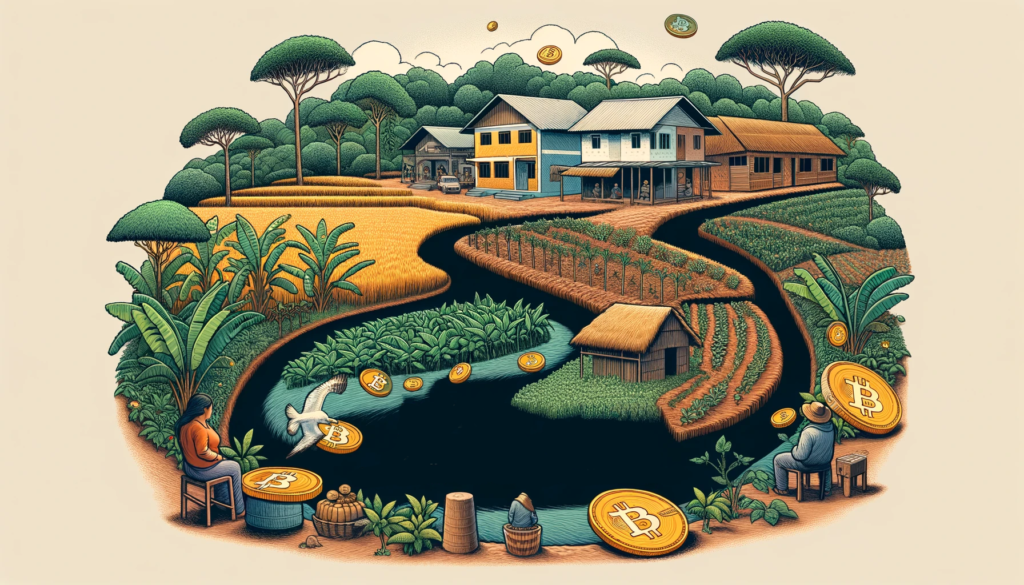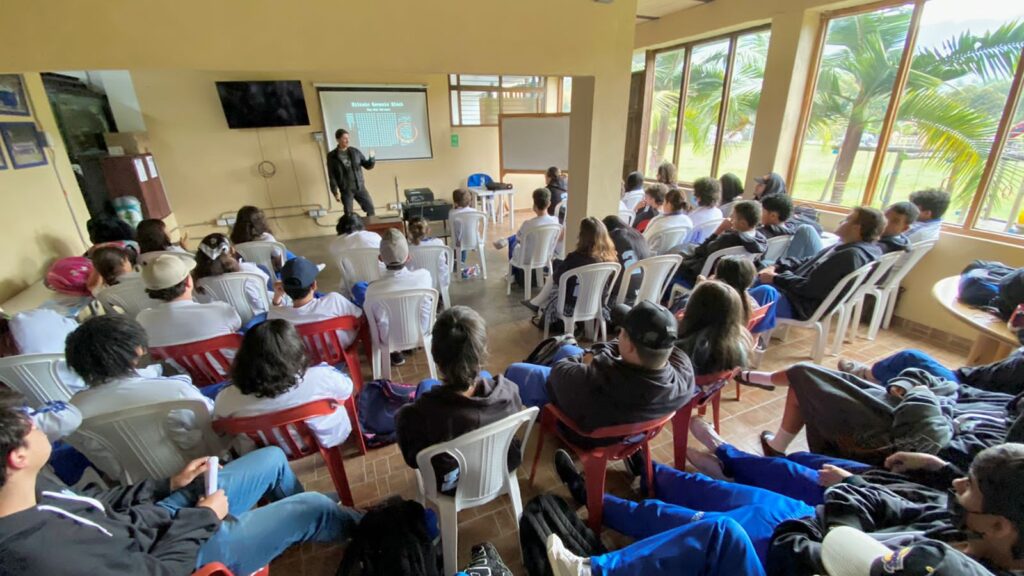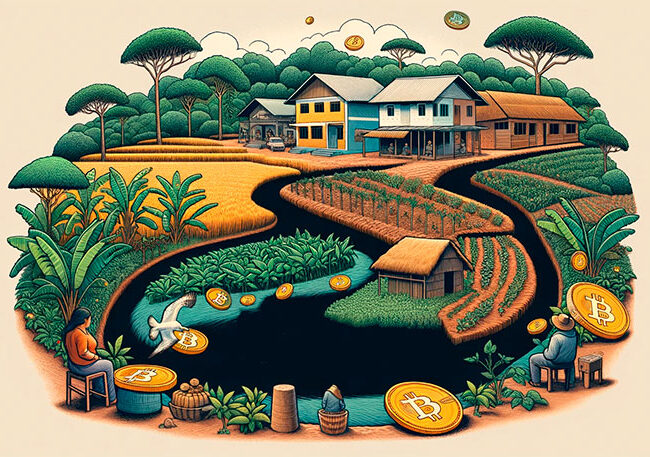Nuestras provocaciones
[Piloto] Banca Comunitaria adoptando Bitcoin en comunidades agroecológicas de Colombia
In brief:
This pilot seeks to promote financial inclusion, economic autonomy, and sustainable prosperity in historically marginalized communities through the educational and practical implementation of community banking and Bitcoin as a monetary alternative.
This project, rooted in previous experiences and lessons learned from implementations in Latin America, aims to build community banking and resilient economies, empowering young people as agents of change, strengthening the digital and financial capabilities of communities, enhancing ecotourism, and connecting agroecological producers with new markets through the diversification of payment methods and the creation of cooperation networks.
The initiative, accompanied and closely monitored by the Pluriversa team, aims to protect communities from inflationary environments and open doors towards active and educated participation in the global digital economy while preserving and promoting sustainability and local cultural and environmental wealth.
Location:
La Chorrera in Predio Putumayo, department of Amazonas, Colombia.
Beneficiaries:
- Indigenous Murui, Ibuz+, Bora, and Muinane.
- Other Amazonian actors located in cities in Colombia and/or abroad.
Key Partners:
- Agroecological partner: Espíritu de Abundancia. Richard Decaillet.
- Young leader: Jhorman Remuy (20 years old), an indigenous young man from La Chorrera, is interested in adopting Bitcoin.
Sector:
Financial inclusion, Blockchain
A Provocation by:
- Miguel Bello

General Objective
Promote Bitcoin-based community banking as a tool for economic empowerment and financial diversification in agroecological communities in Colombia, driven by the potential of the cryptocurrency to strengthen local economies and improve the autonomy and well-being of its inhabitants.
Promote Bitcoin-based community banking as a tool for economic empowerment and financial diversification in agroecological communities in Colombia, driven by the potential of the cryptocurrency to strengthen local economies and improve the autonomy and well-being of its inhabitants.
Specific Objectives
Hypothesis
By adopting Bitcoin in agroecological communities in Colombia, community banking can diversify and strengthen their economies, protecting them from inflationary environments and opening new market opportunities, especially if youth act as facilitators and local merchants actively participate.
Approach
Relevant Social Actors
Target community: La Chorrera
The Murui, Ibuz+, Bora, and Muinane indigenous communities of La Chorrera in Putumayo face significant challenges in chili pepper production and its national and international market valuation. Low production of only 2 kg/month and weak local and national institutional capacity in La Chorrera have limited the expansion of this crop. High logistics costs due to the lack of adequate access roads, financial exclusion, and adopting foreign habits have led to low production and valuation of the Amazonian chili pepper.
This problem is aggravated by the lack of motivation and loss of agricultural vocation among young people, who often opt for destructive activities such as illegal mining and joining armed groups, challenging social cohesion and community peace. In addition, the disarticulation between science and traditional indigenous knowledge has led to a lack of knowledge and low valuation of chili peppers in the markets and among end consumers.
The “Espíritu de Abundancia” project addresses the low production and valuation of chili peppers in La Chorrera through a comprehensive strategy that combines cultural, productive, commercial, and environmental strengthening of the indigenous community. It focuses on increasing chili powder production from 2 kg to 20 kg/month and strengthening the Amazonian chili value chain. The innovation lies in adopting agroecological practices for chili pepper cultivation, improving productivity, and respecting the environment. In addition, traditional methods and chili bell pepper varieties are valued, exploring their potential through culinary encounters between partners, customers, and the community.
Through “Espíritu de Abundancia” these communities have a significant opportunity to improve the production and valuation of Amazonian chili peppers in national and international markets, where there is a growing and diverse demand.
However, financial exclusion, lack of financial education, and money management risks hinder the scaling up of these agroecological practices.
Resources Needed
Estimated Times
Preparatory Phase (2 months): Identification of actors, preparation of materials, and initial coordination.
Training and Design Phase (3 months): Implement workshops, courses, and training sessions for youth and merchants. Design of the community banking governance model adopting Bitcoin.
Implementation Phase (6 months): Initiation of Bitcoin adoption in transactions, monitoring, and adjustments. Establishment of community banking.
Evaluation Phase (1 month): Analysis of results, identification of areas for improvement, and planning of next steps.
Conclusion
This pilot seeks to set a precedent for how communities in marginalized territories can leverage emerging technologies such as Bitcoin to improve their living conditions and strengthen their economic autonomy. With the support of key stakeholders and a structured implementation, the community banking project adopting Bitcoin can potentially deliver tangible, scalable, and sustainable benefits to the communities involved.
FAQ - Key questions
1. How does the pilot address the challenges of social impact investing for the Global South?
Our pilot addresses the challenges of social impact investing in the Global South through several key strategies. First, it facilitates the financial inclusion of marginalized communities using Bitcoin, offering access to the global economy and promoting sustainable practices in agro-ecological communities. This initiative also emphasizes the importance of youth empowerment in technology adoption, ensuring intergenerational knowledge transfer and long-term sustainability of the project. In addition, it promotes the creation of circular economies and the internationalization of local producers, enabling them to access international markets and fostering self-sufficiency.
The pilot also includes financial and digital education to improve the competence and autonomy of communities in the digital space, preserving and promoting local cultures through digital platforms. Collaborative networking between local communities and global players is encouraged, increasing knowledge sharing and business opportunities. This project offers unprecedented transparency and traceability through blockchain technology, and empowers community autonomy, decreasing dependence on external support. Together, these measures not only address immediate challenges, but also establish a framework for sustainable and inclusive community prosperity in the Global South.
2. Why community banking?
In difficult environments, communities often struggle to survive, leading them to rely on informal or illegal financial services that perpetuate poverty. These include usurious loans with high interest rates, illegal lending services such as "pagadiario" or "gota a gota", unsustainable pyramid schemes, and gambling, which rather aggravate their economic situation. In addition, women's lack of economic autonomy often keeps them trapped in cycles of gender-based violence.
On the other hand, community banking offers a sustainable alternative, operating in groups that practice savings and credit with rigorous methodologies and start-up support. These groups allow members to borrow at low rates and promote trust and social fabric, contributing to local prosperity and the identification of new leadership. In Colombia, the GLAC methodology of these groups is regulated, highlighting their focus on people and improving their quality of life through savings and credit.
3. Why is Bitcoin relevant in the context of this pilot?
Bitcoin is crucial to this pilot for several key reasons. First, it is the most widely recognized and globally adopted cryptocurrency, making it ideal for communities seeking to integrate into international markets and attract tourists. As a store of value, Bitcoin offers long-term stability, protecting against inflation, an essential feature for volatile Latin American economies. Its decentralized nature gives communities greater economic autonomy, free from government or financial constraints.
In addition, the security and transparency of Bitcoin's blockchain technology fosters trust and reduces fraud. The Bitcoin network is robust and secure, with an extensive community of developers ensuring its constant improvement and accessibility, even for communities unfamiliar with digital technology. Bitcoin has proven to be effective at the national and community level in regions such as El Salvador, offering a replicable model. Its ease of use, accessibility and low transaction cost, along with the support of a vast global community, position it as the most viable and effective option to empower marginalized communities and connect them to the global economy.
4. Why Bitcoin can protect small savers?
The global financial system, dominated by a debt-based economic model, has generated a cycle of economic boom and bust, characterized by overinvestment and speculation resulting in bubbles and severe recessions. This situation has led to worrisome debt, especially in emerging countries, affecting all industries and people, and exacerbating problems such as boom and bust cycles, excessive leverage, systemic risk, economic inequality, and dependence on unsustainable growth. This vicious cycle is crucial to understand because of its impact on the global economy and everyday life.
In this context, Bitcoin emerges as a decentralized and deflationary alternative to the traditional financial system. Not being subject to government control, Bitcoin proposes a form of economic independence and a more stable store of value. However, despite offering new possibilities compared to fiat money and government-controlled monetary systems, Bitcoin is not a panacea for debt problems. Responsible debt management and taxation remain challenges that require solutions beyond cryptocurrency adoption.
5. How will Bitcoin's price fluctuation be managed on a day-to-day basis?
Effective management of Bitcoin price volatility is vital in the pilot project due to its fluctuating nature. To protect against short-term fluctuations there are several strategies that could be implemented, for example, maintaining a diversified portfolio that includes Bitcoin, and local currency. Converting Bitcoin to local currency after receiving payments and creating emergency reserves in local currency. Ongoing education on the Bitcoin protocol and community support are essential to understand and manage the associated financial risks. In addition, community stabilization funds and flexible credit policies (if credit is enabled) can be implemented to adapt to market volatility.
For merchants, hybrid pricing and short-term fixed price agreements can be employed to minimize exposure to long-term volatility. Other tactics include Dollar Cost Averaging to reduce the impact of volatility on long-term investments and the use of stablecoins for certain transactions. Exploring financial hedging options and establishing partnerships with cryptocurrency exchange platforms can also offer additional protection. Successful implementation of these strategies requires a balance between taking advantage of opportunities and mitigating risks, with ongoing planning and adaptation to changing cryptocurrency market conditions.
6. What is the use case for Bitcoin in terms of sustainability?
Bitcoin and its environmental impact generate a complex debate, but there are arguments in favor of its sustainability. A significant portion of the energy to mine Bitcoin comes from renewable sources, and the industry is constantly looking for cleaner and cheaper energy. Compared to the traditional banking system or the gold industry, Bitcoin consumes less energy. Moreover, its energy consumption contributes to its security and decentralization, making any attack extremely costly. In terms of social and economic sustainability, Bitcoin facilitates access to global financial systems for marginalized communities, offering financial inclusion and resilience to inflation.
This pilot, focused on marginalized communities in Colombia and the Global South, recognizes that Bitcoin can be key to the long-term sustainability of these communities. Environmental criticism has driven innovations within the Bitcoin ecosystem, such as greener consensus protocols and Layer 2 technologies for efficient transactions. Bitcoin not only presents opportunities for economic and social empowerment, but can also be a useful tool for funding green projects, verifying sustainable supply chains and offsetting carbon. Sustainability in this context encompasses environmental, economic and social aspects, and Bitcoin offers promising solutions on these fronts.
Still, the sustainability use case for Bitcoin is more complex and exciting. For a full reply, please write to hello@pluriversa.org.
7. What do we intend to do, why is it important and what do we expect the impact of the pilot to be?
The pilot project seeks to integrate Bitcoin into community banking in ecotourism and agroecological communities in Colombia, especially in sectors with financial barriers and limited access to broad markets. In Latin America, economic challenges such as inflation and high national and international transfer fees erode the income of agroecological producers, while globalization and technological advances offer new opportunities. Bitcoin presents itself as a counter-hegemonic tool to address these concerns.
The pilot anticipates positive impacts on youth prosperity, empowerment, financial resilience, autonomy, strengthening circular economies and access to international markets. It is expected to increase financial autonomy and foster local circular economies. Despite challenges such as resistance to change and the need for technological infrastructure, with appropriate education and training, these obstacles can be overcome. The collaboration with Pluriversa will ensure continuous monitoring to measure impact and adjust the project, with the goal of not only addressing current financial challenges, but also fostering long-term sustainable prosperity and community empowerment.
8. What is innovative about our pilot?
This is a pioneering initiative that introduces Bitcoin in marginalized communities, combining cryptoeconomics, ecotourism and agroecology. This financial innovation promotes local circular economies, allowing trade and exchange of services to take place within the community, thus strengthening economic autonomy and minimizing dependence on national currencies. In addition, the project stands out for its intergenerational approach, assigning young people a crucial role as technological facilitators, and offering holistic training in internet use, community stewardship of funds and community bank structuring.
The initiative acts as a hybrid model that intersects philanthropy, impact investing and financial education, maximizing social impact and promoting community empowerment. In addition, it introduces blockchain technologies and educational tools in emerging technologies, positioning communities on a path of technological adaptation. With the support of Pluriversa, the project adapts and learns in real time, ensuring its scalability and replicability in other communities. This innovative approach seeks to empower communities to operate outside of traditional financial systems, creating sustainable and self-determined community empowerment and prosperity.
9. What do we hope to learn from the pilot?
In this pilot, we hope to deepen our understanding of how Colombian and Global South communities, with their varied cultural, socioeconomic and technological realities, adapt to Bitcoin technology in their community banking. We seek to identify barriers and facilitators, with a particular focus on intergenerational dynamics and technological adoption, and how youth act as agents of change. In addition, we will examine the local economic impact of Bitcoin in terms of trade, financial resilience, tourism and circular economies, while analyzing community and market responses to cryptocurrency adoption.
Our goal is to assess how financial literacy evolves within these communities and the effectiveness of existing Bitcoin technologies, identifying logistical and operational challenges. This learning will not only improve the effectiveness of this project, but also inform future cryptocurrency adoption initiatives in vulnerable communities globally. We aim to develop a replicable model, based on the knowledge and results obtained, that will serve as a guide for future Bitcoin economic empowerment initiatives in similar contexts.
10. What have we done to help communities create a better future and how do we want to involve them in this pilot?
At Pluriversa, we are committed to fostering technological integration in marginalized communities, recognizing that the appropriate adoption of technologies such as Bitcoin can be a powerful tool for socioeconomic progress. Our previous experience includes extensive research on community needs and barriers to Bitcoin, financial education workshops, and the creation of futuristic scenarios for the use of blockchain in post-development. We have participated in the design and implementation of digital solutions for B2C and B2B markets in the financial and energy sector in Colombia, Mexico and Peru, which gives us a solid foundation for this project.

Bitcoin training for young people from the Anglo-Spanish School. On screen the Bitcoin genesis block. La Ceja, Antioquia. 2022.
Our approach to the "Community Banking Adopting Bitcoin" pilot focuses on collaboration and dialogue with communities, employing participatory research methods to center their voices and perspectives. We emphasize youth empowerment, integrating youth into training and knowledge dissemination on emerging technologies. In addition, we work with local merchants to incorporate them into the Bitcoin ecosystem and foster circular economies, while seeking to engage the ecotourism sector. We collaborate with technology providers to ensure secure and efficient transactions, and plan to share success stories to inspire other communities. This comprehensive strategy, with the community at its core, aims to create sustainable and positive change in financial inclusion and economic empowerment through Bitcoin.
11. What is the strategic and tactical approach to conducting this pilot?
At Pluriversa, we apply a strategic and tactical methodology to execute innovation project pilots, tailored to the specificities of each context. We start with thorough preliminary research to understand the context and needs of the target community, using interviews, data analysis and field studies. This approach is complemented by the recruitment of relevant stakeholders, ensuring that our interventions are relevant and effective. The participatory design phase actively involves the community, encouraging co-creation and aligning the project with their real needs. Training is a cross-cutting component throughout the process, equipping the community with essential skills and knowledge.
The pilot is executed in phases, beginning with small-scale testing to assess feasibility, followed by gradual implementation that allows for adjustments based on feedback and community adaptation. Ongoing monitoring by our research team facilitates measurement of impact and identification of improvements. Ongoing feedback from the community and other key stakeholders is vital for project iteration and adjustments. From the outset, we considered scalability, designing the pilot to be expandable and replicable, taking into account economic, cultural and technological variations.
This integrated and adaptable approach has been fundamental to the success of our previous pilot projects and is essential to our community banking initiative adopting Bitcoin.




